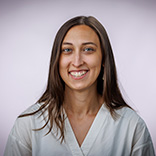Breast and Ovarian Cancer Prevention
Phone: 206.606.6100
Hours: Monday to Friday, 8 a.m.–5 p.m.
Fax: 206.606.6135
Telehealth Appointments Available
We also offer telehealth (online) appointments that you can access conveniently from anywhere using your computer, smartphone or any Internet-connected mobile device. To ask if a telehealth video visit is right for you, call us at 855.557.0555.
The Breast and Ovarian Cancer Prevention (BOCP) Clinic at Fred Hutchinson Cancer Center is for people with a higher risk for breast cancer and/or gynecological cancers. We help patients reduce risk by making personalized prevention and early detection surveillance plans for them.
Before coming to us, patients often have genetic testing done. Then, if a genetic risk is identified, they will come to the BOCP Clinic. Or, if they have a higher risk due to significant family history of breast cancer, they will go to our Breast Health Clinic. Sometimes this pathway can change, depending on the patient.
Not sure where you should be seen? We can help. It’s our job at Fred Hutch to find the best care for you. If you have questions, call us.
The BOCP clinic is located at the Wellness Center. Get a map, directions and other details about this location.
What Happens at Your First Appointment
Before your visit to the Breast and Ovarian Cancer Prevention Clinic at Fred Hutch, our experts will review your medical records, your family history of cancers and the results of any tests you may have completed elsewhere. We will also send you some questions, which you will need to answer and return to us before you schedule your first appointment.
Once we have this information, we will schedule a time to discuss your results and work with you to build your personalized prevention and early detection surveillance plan. The goal is to reduce your risk of developing cancer and to find cancer early when it can be more easily treated, if it does occur.
During this appointment, and depending on your unique risk profile, you may meet with one or more providers, such as a medical oncologist, breast health physician, gynecologic oncologist, genetic counselor or registered dietitian. The length of the visit depends on how many appointments you have, but it is usually about two hours.
Your plan will be as unique as you are. We partner closely with the Clinical Genetics and Counseling Service. We may recommend that you get screened at a Fred Hutch surveillance clinic. This may include visits to our Wellness Clinic for routine exams and close monitoring or visits to our High Risk Surveillance Clinic. In some cases, your prevention plan can be managed by the provider who referred you to us or your primary care provider.
What is included in my personalized prevention plan?
- Information about hereditary (passed down in your family) and nonhereditary breast or gynecological cancer risk factors
- Ways to lower your breast or gynecological cancer risk
- Information about clinical trials you are eligible to be part of through Fred Hutch and the University of Washington Medical Center
- A letter with a detailed summary of your visit
What are some of the strategies that may be used to reduce my risk?
Your BOCP multidisciplinary team will work with you to customize a plan that may include:
- Blood tests
- Chemoprevention or medication
- Imaging, like mammograms, ultrasounds or magnetic resonance imaging (MRI)
- Lifestyle changes, such as changes in diet and exercise
- Participating in clinical trials, if you choose
- Risk-reducing surgery
- Screening with physical exams
“Finding out that you are at risk for ovarian cancer can lead to significant worry. In this clinic, we give our patients the tools to help them manage their risk. They are not in this alone, and we will use our knowledge to build a plan that is right for them.”
— Barb Norquist, MD, Medical Director, Breast and Ovarian Cancer Prevention Clinic
Frequently Asked Questions (FAQs)
Family history and genetic testing both provide important clues about your risk level. You may be at high risk of developing breast or gynecological cancer if:
- You had an abnormal result on your genetic test, such as testing positive for a BRCA1 or BRCA2 pathogenic variant
- You have Lynch syndrome or another genetic abnormality linked with breast cancer, ovarian cancer or uterine cancer
- Two or more relatives on the same side of your family have had breast or ovarian cancer, especially if the breast cancer was diagnosed before age 40
- A relative had cancer in both breasts
- A relative had both breast and ovarian cancer
- Male relatives have had breast cancer
Genetic counseling is the process of providing education and emotional support to patients about inherited conditions and how they impact a person and their family. The goal of genetic counseling is to provide clear, useful information about genetic risk factors in a way that helps you learn more and make decisions about cancer treatment, prevention or early detection.
If you have a genetic risk for a breast or gynecological cancer, more frequent screening and surveillance will allow your physicians and care providers to find any abnormalities in their early stages, when they can be more easily treated. And, for some patients at risk of breast or gynecological cancer, risk reduction surgery can reduce their risk by a lot.
If you do develop a type of breast or ovarian cancer, knowing your genetic test results can lead to more effective, precise treatments, which can mean better outcomes for you.
Supportive Care Services

Raymond Palko, MS, RD, CSO, CD

Katie Neimeyer, MS, CGC
What Each Team Member Does
Advanced Practice Provider (APP)
These health care professionals work closely with your physician. There are two types: physician assistants (PAs) and advanced registered nurse practitioners (ARNPs). They help provide and coordinate your treatment and can see you without your physician. They also help manage any effects of your disease and treatment.
Breast Health Specialist
If a physician discovers an abnormality in a patient’s breast, they may refer them to a physician known as a breast health specialist. The breast health specialist will do more tests to find out whether the abnormality is cancerous or noncancerous. A breast health specialist may also work in breast cancer prevention and develop plans for reducing risk.
Breast Medical Oncologist
If a patient is diagnosed with breast cancer, they may be seen by a breast medical oncologist. This specialist will decide what types of medicine-based treatments might help the patient, such as chemotherapy or endocrine therapy to treat a hormone-related cancer. Medical oncologists can also prescribe medicine to help prevent cancer from spreading, slow its growth and reduce symptoms related to cancer.
Genetic Counselor
This specially trained health care provider helps you understand your risk of a genetic disorder. A genetic counselor can also determine if genetic testing could be helpful for you, based on your personal and family medical and health history. After you have had genetic testing, a genetic counselor can offer information and resources for prevention; connect you with prevention programs, such as those available at Fred Hutch; and help with testing your family members, based on your results. Fred Hutch Genetic Counseling Service providers are all licensed, board-certified genetic counselors.
Gynecologic Oncologist
If a patient is diagnosed with a gynecologic cancer, is suspected to have a gynecologic cancer or is at higher risk of gynecologic cancer, they may be seen by a gynecologic oncologist. Gynecologic oncologists provide complete surgical and medical care, including chemotherapy if needed. Some examples of conditions treated by gynecologic oncologists are ovarian cancer, endometrial cancer, cervical cancer, vulvar cancer, advanced gynecologic surgery and inherited risk of cancer.
Patient Care Coordinator
The patient care coordinator will likely be one of the first people you meet when you come to Fred Hutch. They will gather your medical records and family health history and help guide you to the appropriate genetics or prevention care services within Fred Hutch.
Registered Dietician
Registered dietitians are credentialed food and nutrition experts. To earn this title, they must go through a lot of training and formal education, including doing an internship and passing a national registration exam. Registered dietitians provide medical nutrition therapy, which means they use an evidence-based approach to treat and help patients manage medical conditions through diet and nutrition.
Registered Nurse (RN)
Your nurse manages your care alongside your physician. They also assist with procedures and treatments. Nurses are resources for you and your caregiver. They answer questions and help with a wide range of topics, like how to cope with side effects or get other services you need at Fred Hutch.
Social Worker
Fred Hutch social workers are professionals who are trained to offer support to patients who have received a cancer diagnosis, are going through cancer treatment or are in recovery. They also work with people who are at high risk for cancer. Oncology social workers are key team members who have the knowledge and resources to help connect you with the right resources, such as psychiatry and psychology services, to support you through preventive care or treatment.